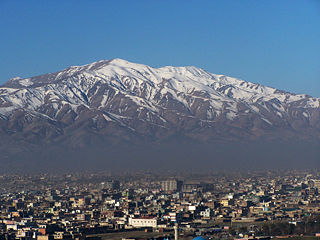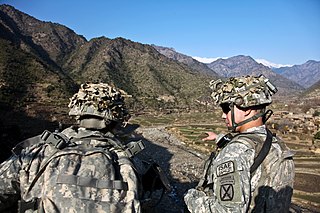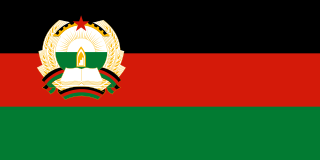Afghanistan is divided into:
Subdivisions of Asia | |
|---|---|
| Sovereign states |
|
| States with limited recognition | |
| Dependencies and other territories | |
| | This Afghanistan location article is a stub. You can help Wikipedia by expanding it. |
Afghanistan is divided into:

Afghanistan, officially the Islamic Emirate of Afghanistan, is a landlocked country located at the crossroads of Central Asia and South Asia. Referred to as the Heart of Asia, it is bordered by Pakistan to the east and south, Iran to the west, Turkmenistan to the northwest, Uzbekistan to the north, Tajikistan to the northeast, and China to the northeast and east. Occupying 652,864 square kilometers (252,072 sq mi) of land, the country is predominantly mountainous with plains in the north and the southwest, which are separated by the Hindu Kush mountain range. As of 2021, its population is 40.2 million, composed mostly of ethnic Pashtuns, Tajiks, Hazaras, and Uzbeks. Kabul is the country's largest city and serves as its capital.

Kabul is the capital and largest city of Afghanistan. Located in the eastern half of the country, it is also a municipality, forming part of the Kabul Province; it is administratively divided into 22 municipal districts. According to late 2022 estimates, the population of Kabul was 13.5 million people. In contemporary times, the city has served as Afghanistan's political, cultural, and economical centre, and rapid urbanisation has made Kabul the 75th-largest city in the world and the country's primate city.

Operation Enduring Freedom (OEF) was the official name used synonymously by the U.S. government for both the War in Afghanistan (2001–2021) and the larger-scale Global War on Terrorism. On 7 October 2001, in response to the September 11 attacks, President George W. Bush announced that airstrikes targeting Al-Qaeda and the Taliban had begun in Afghanistan. Operation Enduring Freedom primarily refers to the War in Afghanistan, but it was also affiliated with counterterrorism operations in other countries, such as OEF-Philippines and OEF-Trans Sahara.

The Taliban, which also refers to itself by its state name, the Islamic Emirate of Afghanistan, is a Deobandi Islamic fundamentalist and Pashtun nationalist militant political movement in Afghanistan. It ruled approximately three-quarters of the country from 1996 to 2001, before being overthrown following the United States invasion. It recaptured Kabul on 15 August 2021 after nearly 20 years of insurgency, and currently controls all of the country, although its government has not yet been recognized by any country. The Taliban government has been criticized for restricting human rights in Afghanistan, including the right of women and girls to work and to have an education.

Pashtuns, also known as Pakhtuns or Pathans, are an Eastern Iranian ethnic group historically native to the Pashtunistan region of Afghanistan and Pakistan. They were also referred to as Afghans until the 1970s, after the term's meaning had become a demonym for members of all ethnic groups in Afghanistan.

Dari, also known as Dari Persian, is the variety of the Persian language spoken in Afghanistan. Dari is the term officially recognised and promoted since 1964 by the Afghan government for the Persian language, hence it is known as Afghan Persian or Eastern Persian in many Western sources. As Professor Nile Green remarks "the impulses behind renaming of Afghan Persian as Dari were more nationalistic than linguistic" in order to create an Afghan state narrative. Apart from a few basics of vocabulary, there is little difference between formal written Persian of Afghanistan and Iran. The term "Dari" is officially used for the characteristic spoken Persian of Afghanistan, but is best restricted to formal spoken registers. Persian-speakers in Afghanistan prefer to still call their language “Farsi,” while Pashto-speakers may sometimes refer to it as "Parsi." Farsi Dari serves as the lingua franca for inter ethnic communications in Afghanistan.

The Democratic Republic of Afghanistan (DRA), renamed the Republic of Afghanistan in 1987, was the Afghan state during the one-party rule of the People's Democratic Party of Afghanistan (PDPA) from 1978 to 1992.

The Soviet–Afghan War was a protracted armed conflict fought in the Democratic Republic of Afghanistan from 1979 to 1989. It saw extensive fighting between the Soviet Union and the Afghan mujahideen after the former militarily intervened in, or launched an invasion of, Afghanistan to support the local pro-Soviet government that had been installed during Operation Storm-333. Most combat operations against the mujahideen took place in the Afghan countryside, as the country's urbanized areas were entirely under Soviet control.

Hamid Karzai is an Afghan statesman who served as the fourth president of Afghanistan from July 2002 to September 2014, including as the first elected president of the Islamic Republic of Afghanistan from December 2004 to September 2014. He previously served as Chairman of the Afghan Interim Administration from December 2001 to July 2002. He is the chief (khān) of the Popalzai Durrani tribe of Pashtuns in Kandahar Province.

Pashto is an Eastern Iranian language in the Indo-European language family. It is known in historical Persian literature as Afghani.

The Durand Line, forms the Afghanistan–Pakistan border, a 2,670-kilometre (1,660 mi) international land border between Afghanistan and Pakistan in South Asia. The western end runs to the border with Iran and the eastern end to the border with China.

The national flag of the Islamic Emirate of Afghanistan, also used as the flag of the Taliban, consists of a white field with a black Shahada. It was adopted on 15 August 2021 with the victory of the Taliban in the 2001–2021 war. Since the Anglo-Afghan War of 1919, also known as the War of Independence, Afghanistan has used about 19 national flags, more than any other country in this period. The national flag had black, red and green colors most of the time during the period.

Mohammad Ashraf Ghani Ahmadzai is an Afghan politician, academic, and economist who served as the president of Afghanistan from September 2014 until August 2021, when his government was overthrown by the Taliban.

Afghanistan is divided into 34 provinces. The provinces of Afghanistan are the primary administrative divisions. Each province encompasses a number of districts or usually over 1,000 villages.

The War in Afghanistan was an armed conflict from 2001 to 2021. It began when an international military coalition led by the United States launched an invasion of Afghanistan, toppling the Taliban-ruled Islamic Emirate and establishing the internationally recognized Islamic Republic three years later. The conflict ultimately ended with the 2021 Taliban offensive, which overthrew the Islamic Republic, and re-established the Islamic Emirate. It was the longest war in the military history of the United States, surpassing the length of the Vietnam War (1955–1975) by approximately 6 months.

Rashid Khan Arman is an Afghan international cricketer and captain of the Afghanistan national team in T20I format. In franchise leagues, he plays for Gujarat Titans in the Indian Premier League (IPL), Adelaide Strikers in Australia's Big Bash League (BBL), Lahore Qalandars in the Pakistan Super League (PSL), and Band-e-Amir Dragons in Afghanistan's Shpageeza Cricket League. He bowls right-arm leg spin and bats right-handed.
The Islamic State–Taliban conflict is an ongoing armed conflict between the Islamic State and the Taliban in Afghanistan. The conflict escalated when militants who were affiliated with Islamic State – Khorasan Province killed Abdul Ghani, a senior Taliban commander in Logar province on 2 February 2015. Since then, the Taliban and IS-KP have engaged in clashes over the control of territory, mostly in eastern Afghanistan, but clashes have also occurred between the Taliban and IS-KP cells which are located in the north-west and south-west.

A military offensive by the Taliban insurgent group and allied militants led to the fall of the Kabul-based Islamic Republic of Afghanistan and the end of the nearly 20-year War in Afghanistan that had begun following the United States invasion of the country. The Taliban victory had widespread domestic and international ramifications regarding human rights and proliferation of terrorism. The offensive included a continuation of the bottom-up succession of negotiated or paid surrenders to the Taliban from the village level upwards that started following the February 2020 US–Taliban deal.

On 15 August 2021, Afghanistan's capital city of Kabul was captured by the Taliban after a major insurgent offensive that began in May 2021. This led to the overthrowing of the Islamic Republic of Afghanistan under President Ashraf Ghani and the reinstatement of the Islamic Emirate of Afghanistan under the control of the Taliban.

The Islamic Republic of Afghanistan was a presidential republic that ruled Afghanistan from 2004 to 2021. The state was established to replace the Afghan interim (2001–2002) and transitional (2002–2004) administrations, which were formed after the 2001 United States invasion of Afghanistan that had toppled the partially recognized Taliban-ruled Islamic Emirate of Afghanistan. However, on 15 August 2021, the country was recaptured by the Taliban, which marked the end of the 2001–2021 war, the longest war in US history. This led to the overthrow of the Islamic Republic, led by President Ashraf Ghani, and the reinstatement of the Islamic Emirate under the control of the Taliban. The United Nations still recognizes the Islamic Republic as the legitimate government of Afghanistan instead of the Islamic Emirate, the de facto ruling government. The US–Taliban deal, signed on 29 February 2020 in Qatar, was one of the critical events that caused the collapse of the Afghan National Security Forces (ANSF). Following the deal, the US dramatically reduced the number of air attacks and deprived the ANSF of a critical edge in fighting the Taliban insurgency, leading to the Taliban takeover of Kabul.